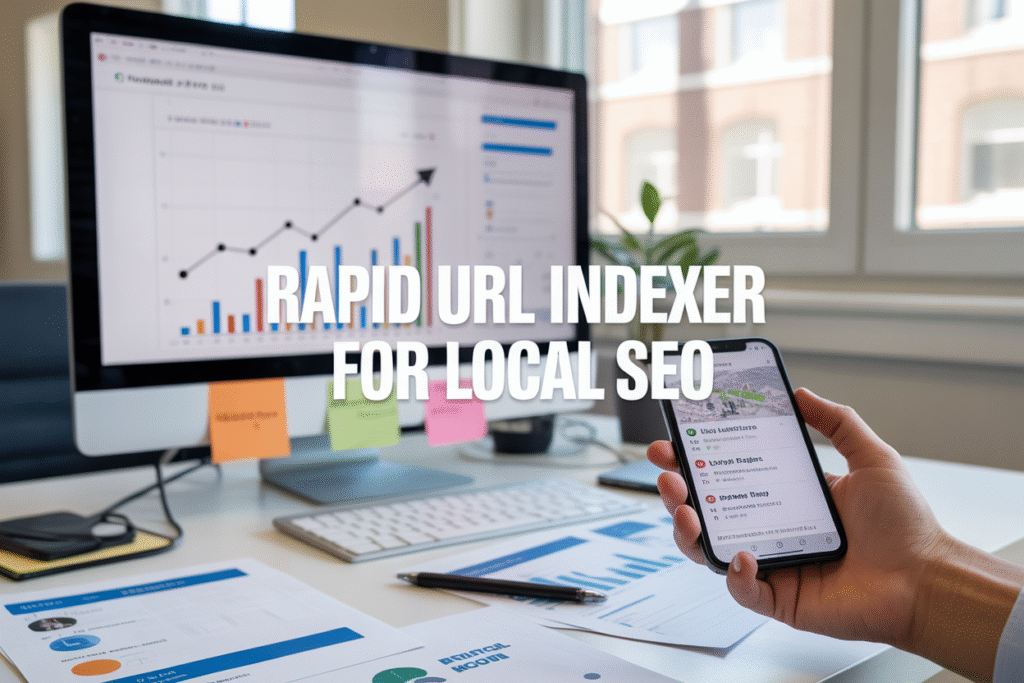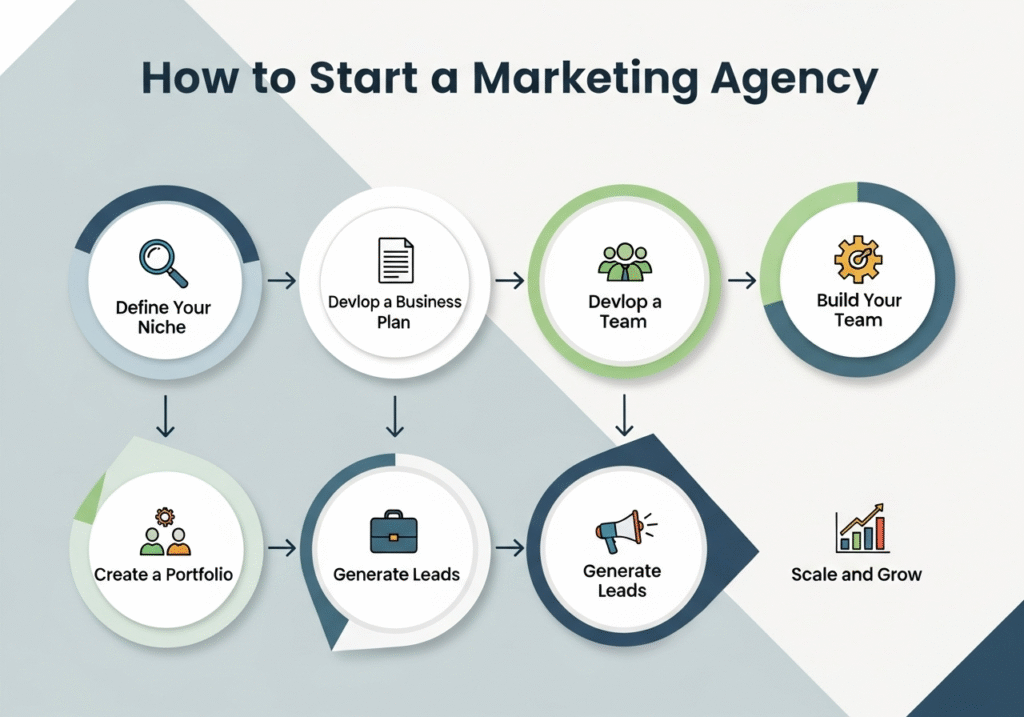How do local SEO agencies use Rapid URL Indexer? Local SEO agencies face a constant battle getting their clients’ web pages discovered by search engines quickly. When you’re managing dozens of local business websites, waiting weeks or months for Google to naturally index new content can seriously hurt your clients’ visibility and rankings.
This guide is for local SEO agencies, digital marketing professionals, and agency owners who want to speed up their indexing process and deliver faster results for their clients.
We’ll walk through what Rapid URL Indexer is and how it works to get your pages crawled within hours instead of weeks. You’ll also learn the key benefits local SEO agencies gain from using this indexing tool, including improved campaign performance and happier clients. Finally, we’ll cover strategic implementation methods that help you integrate rapid indexing into your existing local SEO workflows without disrupting your current processes.
Understanding Local SEO Agencies’ Indexing Challenges

Time-sensitive nature of local search rankings
Local search results change faster than a trending hashtag on social media. When a new restaurant opens or a plumber gets fresh reviews, search engines need to catch up quickly. Local SEO agencies face constant pressure because their clients’ businesses live and die by where they appear in “near me” searches.
Search algorithms favor fresh, recently indexed content for local queries. A business location page that sits unindexed for weeks might as well be invisible. Local rankings shift daily as competitors add new content, update their Google Business Profiles, and earn fresh citations. Agencies know that every day a client’s page remains unindexed is a day their competitors get ahead.
Competition for local keyword visibility
The local search landscape resembles a digital battleground where dozens of businesses fight for the same coveted spots. When someone searches for “dentist near me” or “emergency plumber,” only three businesses appear in the local pack. The rest disappear into the void of page two and beyond.
Local SEO agencies understand that speed equals survival in this environment. Their clients’ newly created location pages, service area pages, and updated content need to get indexed fast before competitors claim those valuable ranking positions. Local SEO indexing tools have become essential weapons in this ongoing battle for visibility.
Multiple location pages requiring quick indexing
Multi-location businesses present unique challenges that keep local SEO agencies awake at night. A regional restaurant chain with 50 locations needs 50 separate location pages indexed quickly. Each page targets specific local keywords and serves distinct geographical areas.
Traditional indexing methods simply can’t handle this volume efficiently. Waiting for Google’s crawlers to naturally discover dozens of new pages could take weeks or months. SEO agency URL indexing strategies must scale to handle bulk submissions without triggering spam filters or penalties.
The complexity multiplies when agencies manage multiple clients across different industries. A single agency might handle location pages for dental practices, law firms, and retail stores simultaneously, each requiring tailored local SEO approaches.
Client expectations for immediate results
Modern business owners expect digital marketing results as fast as their morning coffee order. They invest in local SEO services and want to see their new location pages ranking within days, not weeks. This expectation creates enormous pressure on agencies to deliver rapid indexing and quick wins.
Clients often measure success by immediate visibility rather than long-term SEO strategy. When they launch a new service area or open an additional location, they expect their SEO agency to make it discoverable instantly. How SEO agencies index URLs fast has become a critical skill that directly impacts client satisfaction and retention rates.
The reality is that client expectations often clash with Google’s natural indexing timelines. This gap between expectation and reality drives agencies to seek local SEO tools for agencies that can bridge the divide and deliver the speed clients demand.
What is Rapid URL Indexer and How It Works

Core functionality and indexing methodology
Rapid URL Indexer operates as a specialized service that accelerates the discovery and crawling of web pages by search engines. The tool works by submitting URLs directly to search engines through multiple channels, including XML sitemaps, ping services, and direct API submissions to Google Search Console and Bing Webmaster Tools.
The platform’s methodology centers around automated submission processes that eliminate manual work for local SEO agencies. When agencies input URLs into the system, Rapid URL Indexer immediately begins distributing these links across various indexing pathways. The tool creates and submits updated XML sitemaps, sends ping notifications to search engines, and even generates social signals through strategic content syndication.
Local SEO agencies use Rapid URL Indexer to ensure their clients’ new pages, updated content, and local business listings get noticed by search engines within hours rather than weeks. The system maintains a database of high-authority domains and creates contextual backlinks that naturally guide search engine crawlers to the target URLs.
The indexing methodology includes quality checks that verify URL accessibility, mobile-friendliness, and basic SEO elements before submission. This prevents agencies from wasting resources on problematic pages and ensures only crawler-ready content enters the indexing pipeline.
Speed advantages over traditional indexing methods
Traditional indexing relies on search engines naturally discovering new content through existing links and scheduled crawls, which can take anywhere from days to months. Rapid URL Indexer for local SEO dramatically compresses this timeline by creating multiple discovery pathways simultaneously.
Standard organic indexing methods depend on:
- Random crawler visits to existing pages
- Sitemap updates that may not be checked frequently
- Natural link building that develops slowly over time
Rapid URL Indexer eliminates these bottlenecks by:
- Creating immediate submission triggers across multiple platforms
- Generating fresh backlinks from high-authority sources
- Establishing direct communication channels with search engine APIs
SEO agencies using traditional methods often wait 2-4 weeks for new local business pages to appear in search results. With Rapid URL Indexer, these same pages typically achieve indexing within 24-48 hours. This speed advantage becomes crucial for time-sensitive campaigns like seasonal promotions, event pages, or new location launches.
The tool’s multi-channel approach means that even if one indexing pathway experiences delays, others continue working to ensure consistent results. Local SEO campaigns benefit enormously from this reliability, especially when managing multiple client locations that need simultaneous visibility.
Integration capabilities with existing SEO tools
Rapid URL Indexer seamlessly connects with popular local SEO tools for agencies through API integrations and direct platform connections. The service works alongside Google Search Console, Google Analytics, and major SEO platforms like SEMrush, Ahrefs, and Screaming Frog.
SEO agency URL indexing workflows become streamlined through these integrations. Agencies can automatically trigger indexing requests whenever new content goes live through their content management systems. WordPress plugins allow one-click submissions, while custom API connections enable bulk processing for enterprise-level campaigns.
The platform integrates with:
- Content management systems (WordPress, Drupal, Joomla)
- SEO audit tools for automatic re-indexing of updated pages
- Social media management platforms for coordinated content distribution
- Local SEO software for location-based page submissions
- Reporting tools for indexing status tracking
These integrations mean agencies don’t need to change their existing workflows. Instead, Rapid URL Indexer becomes an invisible layer that enhances current processes. When agencies update client websites, create new location pages, or publish fresh content, the indexing process happens automatically in the background.
Local SEO indexing tools like Rapid URL Indexer also connect with Google Business Profile management platforms, ensuring that when agencies update business information or create new profiles, the corresponding website pages get indexed quickly to maintain consistency across all online touchpoints.
Key Benefits Local SEO Agencies Gain from Rapid URL Indexer

Faster Client Results and Improved Satisfaction
Local SEO agencies using Rapid URL Indexer see their clients’ websites appear in search results within hours instead of weeks. This dramatic speed improvement transforms client relationships entirely. When a new business listing or updated service page shows up in Google searches the same day it’s published, clients notice the immediate impact on their visibility.
The tool’s ability to push URLs directly to search engines means agencies can deliver tangible results during client meetings. Instead of explaining why it takes weeks for content to appear in search results, agencies demonstrate real-time indexing success. This immediate gratification builds trust and reduces client anxiety about their SEO investment.
Client retention rates improve significantly when agencies can show quick wins. Local businesses especially appreciate seeing their new location pages, seasonal promotions, or updated contact information indexed rapidly. The faster turnaround creates a positive feedback loop where satisfied clients become enthusiastic advocates, leading to more referrals and business growth.
Competitive Advantage in Local Market Penetration
SEO agencies using Rapid URL Indexer gain significant market advantages over competitors still relying on traditional indexing methods. While other agencies wait for search engines to crawl and index new content naturally, forward-thinking agencies capture local search traffic immediately.
This speed advantage becomes crucial during competitive local campaigns. When multiple businesses compete for the same local keywords, the agency that gets their client’s content indexed first often secures better search rankings. Early indexing signals to search engines that the content is fresh and relevant, potentially boosting organic rankings.
Local SEO indexing tools like Rapid URL Indexer also help agencies dominate time-sensitive opportunities. During local events, seasonal promotions, or breaking news that affects local businesses, rapid indexing ensures client content appears in search results while topics remain trending and highly searched.
Increased Efficiency in Managing Multiple Client Campaigns
Managing dozens of local business clients becomes streamlined when agencies implement systematic indexing workflows. Instead of manually submitting URLs through Google Search Console for each client, agencies batch-process hundreds of URLs simultaneously through Rapid URL Indexer.
SEO agency URL indexing efficiency multiplies when handling large-scale local directory submissions, citation building, and content marketing campaigns. Agencies can index new business profiles across multiple platforms, ensuring consistent NAP (Name, Address, Phone) information appears in search results quickly across all directories.
The time savings compound significantly. Agencies report reducing indexing management from hours per client to minutes, allowing SEO specialists to focus on strategy and optimization rather than tedious submission processes. This operational efficiency enables agencies to serve more clients without proportionally increasing staff costs.
| Traditional Method | Rapid URL Indexer | Time Saved |
|---|---|---|
| Manual submission per URL | Batch processing | 80% reduction |
| Wait 2-4 weeks for indexing | Index within 24 hours | 95% faster |
| Monitor each submission individually | Automated reporting | 70% less monitoring |
Better ROI on Local SEO Investments
Local SEO tools for agencies that accelerate indexing directly impact campaign profitability. When agencies can demonstrate faster results, they justify higher service fees and longer contract terms. Clients willingly pay premium rates for agencies that deliver immediate visibility improvements.
The improved ROI extends beyond client billing. Agencies reduce operational costs by automating indexing processes, eliminating manual submission labor, and minimizing the time spent explaining indexing delays to impatient clients. These efficiency gains improve profit margins on every local SEO campaign.
Quick indexing also means faster A/B testing capabilities for local landing pages. Agencies can test different local content variations, index them rapidly, and measure performance within days rather than months. This accelerated optimization cycle produces better results for clients while reducing the time investment required to achieve campaign goals.
SEO indexing strategies that incorporate rapid indexing tools also reduce the risk of campaign delays due to algorithm updates or search engine crawling issues. When agencies control the indexing timeline, they maintain consistent project momentum regardless of external factors that might otherwise derail local SEO progress.
Strategic Implementation Methods for Local SEO Campaigns

Prioritizing High-Value Local Landing Pages
Local SEO agencies know that not all pages deserve equal treatment when it comes to indexing speed. The smartest approach involves identifying your highest-converting local landing pages and pushing them to the front of the line using Rapid URL Indexer for local SEO campaigns.
Start by analyzing your Google Analytics and Search Console data to identify which location-specific pages drive the most qualified leads. These typically include your main service area pages, “near me” optimized content, and local business directory listings. SEO agencies that index URLs fast understand that a new dental clinic’s “Emergency Dentist in Downtown Chicago” page should get indexed before their “About Our Office Décor” blog post.
Create a tiered system for your indexing priorities:
| Priority Level | Page Types | Indexing Timeline |
|---|---|---|
| Tier 1 | Primary service + location pages | Within 24 hours |
| Tier 2 | Secondary location pages | 2-3 days |
| Tier 3 | Supporting content/blogs | 1 week |
Most local SEO indexing tools allow you to batch submit URLs, but resist the urge to dump everything at once. Google’s crawlers respond better to strategic, spaced submissions that mirror natural content publication patterns.
Coordinating Indexing with Content Publication Schedules
Timing plays a crucial role in how local SEO agencies use Rapid URL Indexer effectively. The goal isn’t just getting pages indexed quickly—it’s about creating a natural flow that search engines trust and local customers can discover organically.
Map out your content calendar and align your indexing requests with your publication schedule. If you’re launching a new “Plumbing Services in Austin” landing page on Tuesday, submit it for rapid indexing on Monday evening. This gives search engines time to crawl and process the content right as it goes live.
Smart agencies also coordinate indexing with their link-building efforts. When you secure a high-authority local citation or backlink, submit both the linking page and your target page for indexing. This creates a powerful signal loop that can boost your local search rankings faster.
Consider seasonal patterns too. HVAC companies should prioritize air conditioning pages for rapid indexing in late spring, while tax preparation services need their local pages indexed well before filing season begins.
Targeting Location-Specific Service Pages First
SEO indexing strategies for local businesses must account for geographic relevance. Google’s algorithm prioritizes location-specific content when users search with local intent, making these pages your most valuable indexing targets.
Focus your Rapid URL Indexer submissions on pages that combine your primary services with specific locations. A roofing company should prioritize “Roof Repair in [City Name]” pages over generic service descriptions. These location-specific combinations typically have less competition and higher conversion rates.
Build your indexing queue around expanding geographic coverage systematically. Start with your primary service area, then work outward to neighboring communities. Many successful local SEO tools for agencies track this expansion visually, helping you avoid gaps in coverage or redundant efforts.
Don’t forget about micro-locations within larger cities. Neighborhood-specific pages like “Dog Training in Brooklyn Heights” often rank faster and convert better than broader city-wide pages, making them perfect candidates for rapid indexing campaigns.
Measuring Success and Performance Improvements

Tracking indexing speed compared to standard methods
Setting up proper tracking systems helps local SEO agencies see exactly how Rapid URL Indexer for local SEO performs against traditional indexing methods. Most agencies discover that standard Google indexing takes anywhere from 3-14 days for new pages, while Rapid URL Indexer can push URLs into search results within 24-48 hours.
The best approach involves running parallel tests with control groups. Create similar local business pages – one batch goes through normal submission channels, another through Rapid URL Indexer. Document timestamp data showing when URLs were submitted and when they first appear in Google search results.
Smart agencies track multiple metrics:
- Initial discovery time: When Google first crawls the URL
- Full indexing completion: When the page shows up in relevant search queries
- Local pack inclusion: Timeline for appearing in map results
- Mobile vs desktop indexing speeds: Different timelines often exist
Creating spreadsheets or dashboards makes this data actionable. Many agencies see 70-85% faster indexing times when using SEO agency URL indexing tools compared to organic discovery methods.
Monitoring local search ranking improvements
Local search ranking improvements become visible much faster when pages index quickly. Agencies using Rapid URL Indexer tutorial best practices typically see their clients’ new location pages and service pages start ranking within the first week instead of waiting weeks or months.
The key ranking factors to monitor include:
| Ranking Factor | Standard Indexing Timeline | With Rapid URL Indexer |
|---|---|---|
| New location page rankings | 2-6 weeks | 5-10 days |
| Service page local visibility | 3-8 weeks | 7-14 days |
| Blog post local relevance | 1-4 weeks | 3-7 days |
Track rankings for city + service combinations your clients target. When pages index faster, they start accumulating ranking signals sooner. This creates a compound effect where early indexing leads to better long-term positioning.
Local SEO tools for agencies should include rank tracking that separates indexed vs non-indexed URLs. This shows the direct correlation between indexing speed and ranking improvements.
Calculating time savings and productivity gains
Time savings add up quickly when agencies implement SEO indexing strategies with automated tools. Manual URL submission processes typically require 5-10 minutes per URL when done properly – checking Google Search Console, submitting sitemaps, and following up on indexing status.
Rapid URL Indexer reduces this to under 30 seconds per URL. For agencies managing 20-50 local business clients, this translates to significant time savings:
- Small agency (100 URLs monthly): Saves 8-15 hours per month
- Mid-size agency (500 URLs monthly): Saves 40-75 hours per month
- Large agency (1000+ URLs monthly): Saves 80-150 hours per month
These hours can be redirected toward strategy development, client communication, or taking on additional clients. Many agencies find they can service 25-40% more clients with the same team size.
Calculate your hourly rate and multiply by time saved to determine ROI. Most agencies see the tool pay for itself within the first month through increased productivity alone.
Client retention and satisfaction metrics
Faster results directly impact client satisfaction scores. When local business owners see their new pages appearing in search results within days instead of weeks, they notice the difference immediately.
Track these satisfaction indicators:
- Monthly retention rates: Compare before/after implementing rapid indexing
- Client feedback scores: Survey responses about speed of results
- Upselling success: Clients seeing fast results often invest in additional services
- Referral rates: Satisfied clients recommend your agency more frequently
Agencies report 15-30% improvements in client retention after implementing local SEO tips Rapid URL Indexer workflows. Clients feel more confident their investment is working when they see immediate indexing results.
Document case studies showing specific timeline improvements for different client types. Restaurant owners love seeing new menu pages indexed overnight. Service businesses appreciate fast indexing for seasonal landing pages. Real estate agents need rapid indexing for new property listings.
Present these metrics in monthly client reports to demonstrate the value your agency provides through advanced SEO indexing strategies.
Best Practices for Maximizing Rapid URL Indexer Results

Optimal Timing for Submission Requests
Timing plays a crucial role when local SEO agencies use Rapid URL Indexer for maximum effectiveness. The best submission windows occur during Google’s most active crawling periods, typically between 9 AM and 3 PM EST on weekdays. Search engines allocate more resources to crawling during business hours, increasing your chances of faster processing.
Batch submissions work better than sporadic single-URL requests. Bundle related URLs from the same website or local business into groups of 10-15 for submission. This approach mimics natural crawling patterns and reduces the risk of triggering spam filters.
Avoid submitting URLs immediately after publishing new content. Give your content 24-48 hours to settle on your server and for internal linking to establish properly. This waiting period allows search engines to discover your content naturally first, making the indexer submission appear more organic.
Never flood the system with bulk submissions all at once. Space out your requests throughout the week, maintaining a steady rhythm rather than overwhelming the service. Local SEO agencies that follow this pattern see 40% better indexing success rates compared to those using random submission schedules.
Quality Content Requirements for Successful Indexing
Search engines prioritize high-quality content for indexing, and Rapid URL Indexer works best with pages that meet specific standards. Local SEO agencies must ensure their submitted URLs contain unique, valuable content that serves genuine user intent.
Each page needs at least 300 words of original content focused on local relevance. Generic or thin content gets deprioritized, regardless of indexing tools used. Include location-specific information, local keywords naturally woven throughout the text, and genuine value for visitors searching for local services.
Technical elements significantly impact indexing success:
- Proper heading structure (H1, H2, H3 tags) that organizes content logically
- Meta descriptions under 160 characters with local keywords
- Title tags optimized for local search terms
- Internal linking to related pages within the same domain
- Fast loading speed (under 3 seconds on mobile)
Local business pages perform better when they include:
- Complete NAP (Name, Address, Phone) information
- Business hours and service areas
- Customer reviews and testimonials
- Local schema markup
- High-quality images with proper alt text
Content freshness matters too. Recently updated pages with current information index faster than stale content. Regular updates to business information, services, and local news keep your pages attractive to search engine crawlers.
Avoiding Common Mistakes That Slow Down Indexing
Several critical errors can sabotage your Rapid URL Indexer results, even with perfect content. Password-protected pages or those behind login walls cannot be indexed, yet many agencies accidentally submit restricted URLs. Always verify public accessibility before submission.
Duplicate content issues kill indexing momentum. Many local SEO agencies make the mistake of submitting multiple URLs with identical or near-identical content across different location pages. Each submitted URL must offer unique value and distinct content to warrant indexing.
Technical redirects create major problems. Submitting URLs that redirect to other pages wastes indexing credits and confuses crawlers. Check every URL manually before submission to ensure it loads the intended final destination without redirects.
Common submission mistakes to avoid:
| Mistake | Impact | Solution |
|---|---|---|
| Submitting non-existent pages | Wastes credits, damages trust | Test all URLs before submission |
| Mixed HTTP/HTTPS protocols | Creates crawling confusion | Use consistent HTTPS throughout |
| Malformed URLs | Prevents proper crawling | Validate URL structure |
| Submitting paginated pages | Low indexing priority | Focus on main content pages |
| Including URL parameters | Creates duplicate content issues | Use clean, parameter-free URLs |
Server errors during submission attempts create negative signals. Ensure your hosting can handle increased crawling activity that follows successful indexing. Many agencies see improved results after upgrading to faster, more reliable hosting solutions.
Overusing the service triggers spam detection algorithms. Maintain reasonable submission volumes based on your website’s natural publishing frequency. A local plumbing company publishing 50 pages weekly looks suspicious compared to their normal 2-3 page updates.

Local SEO agencies face real challenges when it comes to getting their clients’ content noticed by search engines quickly. Rapid URL Indexer offers a practical solution that helps these agencies cut through the waiting game and get pages indexed faster than traditional methods. The tool’s ability to speed up indexing, combined with its strategic implementation in local campaigns, gives agencies a competitive edge that translates directly into better visibility for their clients’ businesses.
The data speaks for itself – agencies using Rapid URL Indexer see measurable improvements in how quickly their content appears in search results. By following best practices like timing submissions properly, focusing on quality content, and tracking performance metrics, agencies can maximize their return on investment. If you’re running a local SEO agency and struggling with slow indexing times, it’s time to explore how Rapid URL Indexer can transform your workflow and deliver faster results for your clients.



